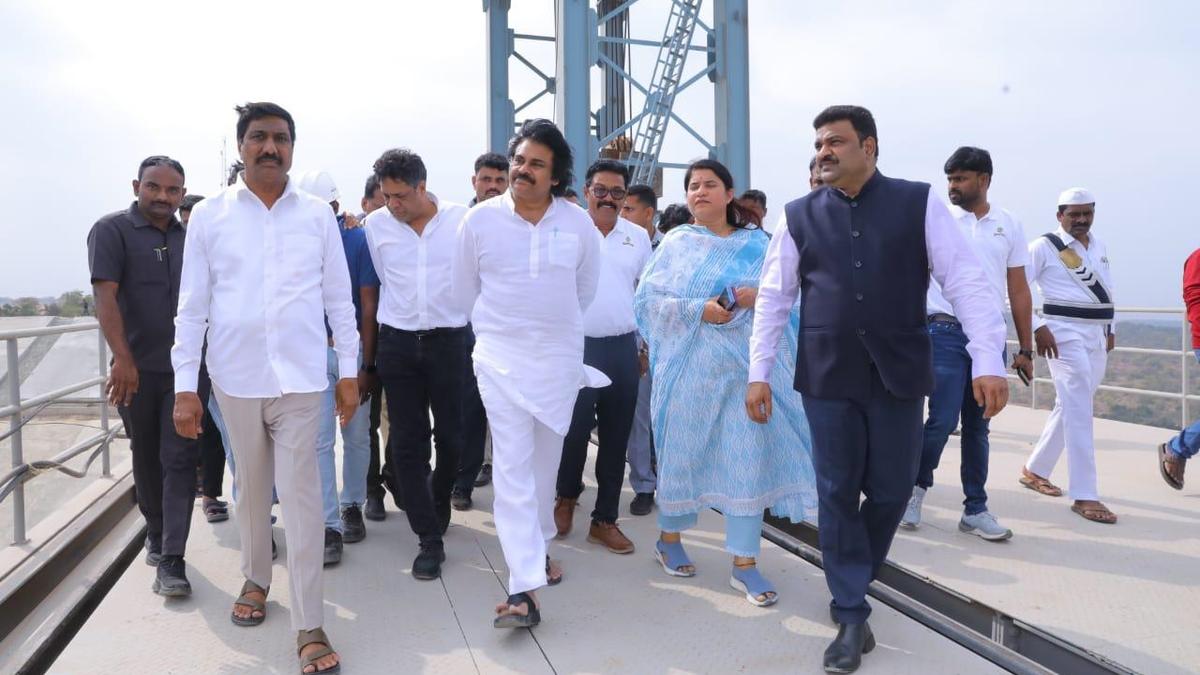In the realm of energy production, few initiatives are as ambitious and impactful as the Integrated Renewable Energy Project (IREP) at Pinnapuram in Kurnool district. Yet, behind the promise of sustainability lies a tangled web of land disputes that date back decades. On a recent visit, Deputy Chief Minister K. Pawan Kalyan shed light on these issues, leaving residents with hope for the future amid the struggles of the past.
The Integrated Renewable Energy Project: An Overview
Introduction to IREP and Its Goals
The Integrated Renewable Energy Project (IREP) is a bold initiative aimed at revolutionizing energy production in Andhra Pradesh. The primary goal of IREP is to harness renewable energy to contribute to a sustainable future. This project is not just about energy; it’s about creating a cleaner environment and a better quality of life for the people.
Deputy Chief Minister K. Pawan Kalyan recently emphasized the importance of renewable energy, stating,
"Renewable energy is our future, and we are committed to making it a reality here in Andhra Pradesh."This commitment reflects the broader vision of the government and Greenko Energy, the company leading the project.
Investment and Project Scope
IREP represents a significant financial commitment. Greenko Energy has invested approximately ₹30,000 crore in Andhra Pradesh alone. This investment is part of a larger national effort, with over ₹1.5 lakh crore dedicated to renewable energy projects across India. The project area spans an impressive 2,800 acres, strategically located across Nandyal and Kurnool districts.
- Investment by Greenko: ₹30,000 crore in Andhra Pradesh
- Project area: 2,800 acres
- Contribution to Pinnapuram project since 2021: ₹10,000 crore
Such a vast investment indicates the potential impact of IREP on the local economy and energy landscape. The project not only aims to provide renewable energy but also seeks to enhance local infrastructure and create job opportunities.
Land Acquisition and Its Implications
Land acquisition is a crucial aspect of IREP. To date, Greenko has secured around 1,700 acres, including 1,453 acres owned by the Revenue Department. Additionally, the company has acquired 365 hectares of forest land, with approvals from the Central government. This acquisition is vital for the development of the project.
However, there are challenges. A contentious dispute exists over 45 hectares of land, with claims from both the Revenue and Forest departments. This issue has historical roots, dating back to 1962. Pawan Kalyan has stated that the matter is now with the Central government for resolution.
Moreover, Greenko is committed to environmental sustainability. They have allocated ₹36 crore for compensatory forest development. This includes restoring and enhancing forest areas affected by the project. The goal is to balance development with environmental conservation.
The implications of IREP extend beyond energy production. Pawan Kalyan highlighted the potential for the site to become a hub for tourism and educational tours. The energy generated could sustainably supply around 4.3 million households with 200 units of electricity each month. This could transform the energy landscape in Andhra Pradesh.
In conclusion, the Integrated Renewable Energy Project is more than just an energy initiative. It embodies a vision for a sustainable and prosperous future for Andhra Pradesh. As the project progresses, it will be essential to navigate the complexities of land acquisition while maximizing the benefits for local communities.
Controversy and Historical Context of Land Disputes
The issue of land disputes in Andhra Pradesh is not a recent phenomenon. It has roots that stretch back to 1962. These disputes are complex, involving multiple stakeholders and layers of governance. They are not just about land; they represent a clash of history, community needs, and development goals.
Overview of Land Disputes Dating Back to 1962
Since 1962, a significant area of land has been embroiled in disputes. The contested area is approximately 45 hectares, which has become a focal point for various government departments. These include the Revenue Department and the Forest Department. Each department claims authority over the land, complicating matters further.
- Revenue Department: Responsible for managing land records and ownership.
- Forest Department: Oversees conservation efforts and land designated as forest.
Legal documents reveal that multiple pattas (land ownership certificates) have been issued since 1962 for parts of this contested land. This history of overlapping claims has created a tangled web of ownership that is difficult to untangle.
Details on Contested Land and Involved Government Departments
The ongoing disputes highlight the challenges faced by the government in managing land resources effectively. The area in question is part of a larger project— the Integrated Renewable Energy Project (IREP) at Pinnapuram. This project spans a vast area of 2,800 acres across Nandyal and Kurnool districts. However, only a portion of this land has been secured by the project developers, Greenko Energy.
Greenko has acquired 1,700 acres so far, but the remaining 365 hectares of forest land has also become a contentious issue. The company has made significant investments, totaling ₹10,000 crore since 2021, but the historical claims on the land remain unresolved. As Pawan Kalyan pointed out, “
We must learn from the past to pave the way for a brighter tomorrow regarding land use.” This quote underscores the importance of addressing historical claims to pave the way for future development.
Impact of Historical Claims on Current Discussions
The historical claims on land have a profound impact on current discussions surrounding land use and development. The fact that issues have persisted for decades raises questions about governance and the effectiveness of land management policies. When land disputes arise, they often lead to tensions within communities. These tensions can hinder development projects that aim to benefit the public.
Pawan Kalyan has referred the matter to the Central government for resolution. This step signifies a proactive approach to resolving long-standing disputes. The government must navigate these historical claims carefully to foster a more harmonious relationship between the various stakeholders involved.
As land disputes continue to evolve, they highlight the complexities of governance in Andhra Pradesh. It is essential to recognize that these disputes are not just bureaucratic issues. They represent the intersection of communities, history, and development. The resolution of these disputes will require collaboration, understanding, and a commitment to addressing the needs of all parties involved.
The Future of Renewable Energy and Tourism Potential
The Integrated Renewable Energy Project (IREP) at Pinnapuram is more than just a power initiative. It promises to illuminate the lives of millions while also opening doors to tourism and educational opportunities. This dual potential has caught the attention of many, including Deputy Chief Minister K. Pawan Kalyan, who recently emphasized its significance during an inspection of the project.
Powering Millions
One of the most striking aspects of the IREP is its capacity to provide electricity to approximately 4.3 million households. This is no small feat. Imagine the impact of reliable energy access on communities that have struggled with power shortages. The project aims to produce 200 units of electricity monthly, which could transform daily life for countless families.
But what does this mean for the future? It means that more homes will have lights, refrigerators, and the ability to connect with the world. With electricity comes opportunity. People can start businesses, children can study better, and communities can thrive.
Sustainable Development Matters
The importance of sustainable development cannot be overstated. As the world grapples with climate change, projects like the IREP offer a glimpse of a greener future. By focusing on renewable energy, the initiative aligns with global efforts to reduce carbon footprints. This is not just about energy; it's about creating a sustainable legacy.
- Environmental Impact: Renewable energy reduces reliance on fossil fuels, leading to cleaner air and a healthier planet.
- Economic Growth: Sustainable practices can lead to job creation in green technologies.
- Community Engagement: Involving local communities in sustainable practices fosters a sense of ownership and responsibility.
As K. Pawan Kalyan aptly stated,
"This project has the potential to not just nourish our energy needs but also to bring people together through sustainable tourism."This sentiment captures the essence of what the IREP aims to achieve.
Tourism Opportunities
Tourism may seem like an unexpected benefit of an energy project, but it holds great potential. The IREP site can become a destination for eco-tourism and educational tours. Visitors could learn about renewable energy, sustainable practices, and the importance of conservation.
Imagine schools organizing field trips to the IREP. Students could see firsthand how renewable energy is harnessed. They could learn about the technology involved and the environmental benefits. This kind of engagement is invaluable.
Moreover, the influx of tourists could provide a significant boost to the local economy. Small businesses could flourish, offering food, accommodations, and guided tours. The region could transform into a hub for eco-conscious travelers seeking to learn and experience sustainable living.
Conclusion
The IREP is not just an energy initiative; it's a model for how sustainable practices can also foster tourism and educational opportunities. As the project progresses, it will be crucial to address the land disputes and ensure that the benefits reach the local communities. The future of renewable energy at Pinnapuram looks bright, and with it, the promise of a sustainable and prosperous tomorrow.
Government Initiatives to Address Land Encroachments
Land encroachments have become a pressing issue in many regions, particularly in Andhra Pradesh. The government is stepping up efforts to tackle this problem, especially regarding forest lands. Deputy Chief Minister K. Pawan Kalyan recently highlighted these initiatives during a visit to the Integrated Renewable Energy Project (IREP) in Kurnool district. His remarks reflect a broader commitment to ecological integrity while pursuing development goals.
Plans to Address Encroachments on Forest Lands
One of the key areas of focus is the encroachment on forest lands across Kadapa, Kurnool, and Chittoor districts. The government plans to launch a dedicated initiative aimed at identifying these encroachments. This initiative will assess the extent of violations and implement corrective measures. It is essential to understand that direct action against encroachments is necessary to protect ecosystems. After all, forest lands are not just areas of trees; they are vital ecosystems that support various forms of life.
Initiatives to Assess Violations
To effectively assess violations, the government will conduct thorough investigations into the claimed areas. This includes reviewing historical records and engaging with local authorities. The aim is to clarify land ownership and resolve disputes that have lingered for decades. For instance, the ongoing dispute over 45 hectares of land, claimed by both the Revenue and Forest departments, has been a contentious issue since 1962. By addressing such issues head-on, the government hopes to restore clarity and fairness in land management.
Moreover, the government is not just looking to penalize violators. Instead, they are focused on implementing corrective measures. This means not only addressing past encroachments but also preventing future violations. The proactive approach is commendable. It shows a commitment to sustainable development and a recognition of the ecological consequences of unchecked land encroachments.
Community Involvement in Addressing Land Issues
Engaging local communities is another crucial element of the government’s strategy. Community involvement can foster support and awareness regarding land issues. After all, local residents often have the most knowledge about the land and its history. They can provide valuable insights into encroachments and help identify areas that require immediate attention.
As K. Pawan Kalyan stated,
“We cannot ignore the ecological impact of land encroachments; our future depends on preserving these natural spaces.”This sentiment underscores the importance of community engagement. When residents are involved in decision-making processes, they are more likely to support conservation efforts and participate in initiatives aimed at protecting their environment.
Conclusion
The government’s commitment to addressing land encroachments sends a powerful message about valuing ecological integrity while pursuing development objectives. As initiatives unfold in areas like Kadapa, Kurnool, and Chittoor, the hope is that these efforts will not only resolve historical disputes but also promote sustainable land management practices. By engaging local communities and implementing corrective measures, the government is taking significant steps toward ensuring that the ecological balance is maintained. The future of these natural spaces depends on collective efforts, and it is a responsibility shared by all.



